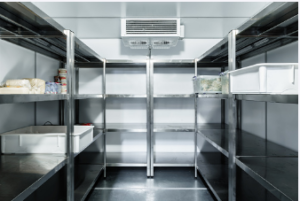Industrial refrigeration units are used for cooling industrial products such as water, cheese and wine/spirits on an industrial scale. Due to constant operation, these units must be adequately maintained to continue functioning correctly and remain functional.
 The market can be divided into segments based on components, refrigerant type and application. Components of this industry include compressors, condensers, evaporators and controls.
The market can be divided into segments based on components, refrigerant type and application. Components of this industry include compressors, condensers, evaporators and controls.
Compressor
Compressors are at the core of every refrigeration system. Their primary function is to increase the pressure and temperature of refrigerant gas to begin the refrigeration cycle, so regardless of their design – screw, piston, centrifugal or rotary types all serve the same purpose.
Once the vaporised refrigerant leaves the compressor, it passes into a condenser or evaporator, absorbing heat from cooler air nearby. The hot vapour condenses to a liquid before passing through a metering device which fulfils two important roles – slowing its entry rate into the evaporator while simultaneously decreasing pressure. Check the industrial refrigeration Adelaide cost information here.
As a result of the COVID-19 pandemic, many industrial facilities experienced an unprecedented spike in refrigeration system needs. This increased demand accelerated market growth, leading manufacturers to invest heavily in new systems.
Industrial refrigeration is most commonly used to store frozen and other processed foods that must be kept at low temperatures to prevent spoilage, as well as pharmaceuticals or chemicals that must be protected from degradation or deterioration by being stored at lower temperatures.
Refrigeration systems are frequently employed in manufacturing plants for process cooling, including chemical, petrochemical and pharmaceutical production facilities.
Evaporator
Industrial refrigeration relies on an evaporator, which draws heat from the surrounding air and evaporates liquid refrigerant into gaseous form for later return to a compressor – thus repeating itself indefinitely.
Industrial refrigeration uses several different evaporators. A common variety is the shell and tube evaporator. This heat exchanger uses small tubes to cool liquid refrigerant in two zones: one is for evaporation. At the same time, the other acts as an overheated area to allow lower temperature operation while maintaining sufficient pressure.
The falling film type evaporator is another type designed to remove excess oil from a system. Liquid enters from the top and falls evenly thin layer down through it, reducing surface area and increasing efficiency.
Industrial refrigeration systems are integral to numerous industries, providing much-needed cooling for offices, hospitals and other commercial spaces and manufacturing processes like creating plastics, metals and other materials. Proper maintenance must also be maintained to avoid issues; the appropriate refrigerants must be utilised.
HYCOOL
HYCOOL is an advanced, non-toxic, low-temperature heat transfer fluid for indirect cooling systems. Its low freezing point and high thermodynamic properties (high thermal conductivity and viscosity) make refrigerant systems much more straightforward. In contrast, its lack of refrigerant charge reduces maintenance costs significantly while increasing equipment longevity.
The HYCOOL project is an international research and development initiative to create industrial cooling through solar heat using hybrid systems, led by Veolia Serveis Catalunya, with 16 partners from six European countries as partners. The main goal is to reduce electricity and natural gas use during industrial processes by as much as 25%, thereby cutting energy costs significantly.
HYCOOL technology utilises Fresnex concentrated solar thermal collectors and Fahrenheit hybrid heat pump technology to provide cost-effective industrial cooling systems at Givaudan’s Sant Celoni site in Spain, where Givaudan produces fragrance ingredients, as well as Bo de Debo SA nearby for the food industry pilot site. Participation in the HyCool project helps Givaudan meet stringent emissions reduction goals while decreasing water, waste, and energy consumption.
Automation
Automation in industrial refrigeration refers to using technology to oversee processes and equipment. Automation is essential in maintaining optimal temperatures, preventing spoilage of semi-processed food and beverages and maintaining freshness during customer deliveries. Automation features can also help save energy costs by improving efficiency and detecting problems before they become critical – something precious regarding fresh produce deliveries. Check the industrial refrigeration Adelaide cost information here.
Refrigeration can help products and processes achieve maximum effectiveness, such as bioprocesses or chemicals with low boiling points. Refrigeration also creates safe environments in manufacturing plants and construction – such as hardening concrete before excavations.
Preston’s Electrical division provides advanced refrigeration control systems tailored to your facility needs, with touchscreen graphical operator interfaces to display and monitor current operating conditions such as temperature, pressures, motor amps, vessel liquid levels and alarm states. Furthermore, this system will manage compressor starting/stopping/load shedding/ice bank operation to maximise energy savings and save costs.


